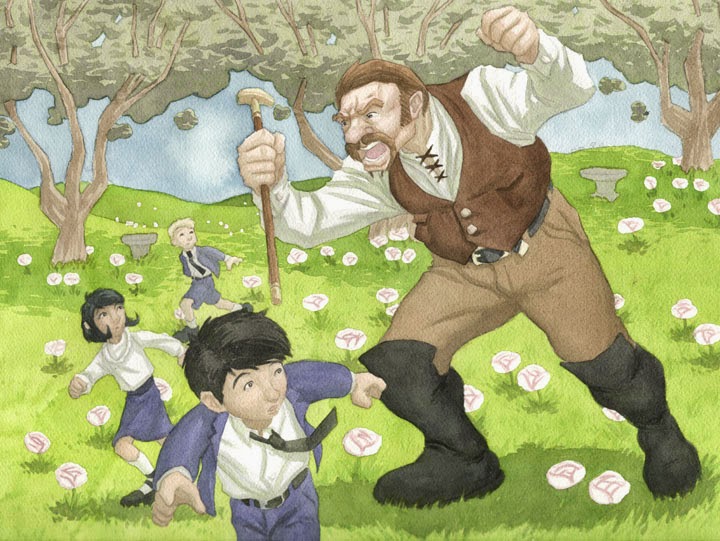We have started and the sun is shinning
Saturday 31 May 2014
Monday 12 May 2014
Easter 4
 The story of the Selfish
Giant by Oscar Wilde is one of my favourite childhood stories. The decision of
the selfish Giant to forbid the children to play in his garden plunges his
garden into a permanent winter whose grip is finally broken when through a
small gap in the wall children once again enter and play and bring Spring to
the permanent winter. There is one tree that remains frozen as the small boy
standing beneath cannot reach up to climb into its branches and so it is the
Selfish Giant who reaches down and tenderly lifts the boy into the tree. So the
Selfish Giant comes to realise that “Children are the most beautiful flowers of
all”. At the end of the story the Giant, now old and weak, looks out on the
winter landscape of his garden and sees one tree in the far end covered in
lovely white blossoms. Its branches golden and silver fruit hung down and
underneath it stood the little boy he loved but had not seen for many years.
The story of the Selfish
Giant by Oscar Wilde is one of my favourite childhood stories. The decision of
the selfish Giant to forbid the children to play in his garden plunges his
garden into a permanent winter whose grip is finally broken when through a
small gap in the wall children once again enter and play and bring Spring to
the permanent winter. There is one tree that remains frozen as the small boy
standing beneath cannot reach up to climb into its branches and so it is the
Selfish Giant who reaches down and tenderly lifts the boy into the tree. So the
Selfish Giant comes to realise that “Children are the most beautiful flowers of
all”. At the end of the story the Giant, now old and weak, looks out on the
winter landscape of his garden and sees one tree in the far end covered in
lovely white blossoms. Its branches golden and silver fruit hung down and
underneath it stood the little boy he loved but had not seen for many years.
The Giant hurries down into
the garden with joy but as he gets near the child he cries out “Who hath dared
to wound thee?” for on the palms of the child’s hands were the print of two
nails and the prints of two nails on his feet. “Tell me that I may take my big
sword and slay him”. “Nay” answered the child “but these are the wounds of
Love”. The child smiled on the Giant and said to him “You let me play once in
your garden, today you shall come with me to my garden, which is Paradise”. And
so when the children ran in that afternoon they found the Giant lying dead
under the tree, all covered with white blossoms.
“I
am the gate for the sheep.” Says Jesus
 In
the Story of the Selfish Giant it is he that prevents the children from playing
in the garden, it was his reaction of
anger and jealousy when he saw the children playing in his garden, that led him
to build the high wall so as to keep them out. It was when he reached out to help a small boy climb a tree that broke the spell of winter in his garden and the hardness of his own heart.
In
the Story of the Selfish Giant it is he that prevents the children from playing
in the garden, it was his reaction of
anger and jealousy when he saw the children playing in his garden, that led him
to build the high wall so as to keep them out. It was when he reached out to help a small boy climb a tree that broke the spell of winter in his garden and the hardness of his own heart.
To
think of the Church as a garden is not as strange as it may seem. The Bible
starts in a garden created by God and into which is placed humanity. The images
used by Jesus speaking about the Kingdom of God point to a place where people
can grow, be transformed and yes even have fun. Can this not also be true of
the Church?
We are
gates to the church by the way in which we make welcome the stranger or the
visitor. In the book of Acts we are given a glimpse or snapshot of the early
church. People met in each others homes and when they were together they broke
bread and recalled the life of the Risen Jesus. We read that they “enjoyed the
favour of all the people, and the Lord added to their number daily” Acts 2.47 The link between growth and “favour”
Literally being open and friendly; being welcoming and supportive is obvious.
Therefore if it was the case then it is still the case today.
The
road to such openness and welcome still stretched before us as we negotiate the
perilous landscape of our day, the competing demands for us to either allow or
forbid. This journey of course carries the memories of so many who have come to
us, come to the church, and found not a beautiful garden where they can flourish but
a high wall of selfish resentment blocking their way.
Subscribe to:
Posts (Atom)





